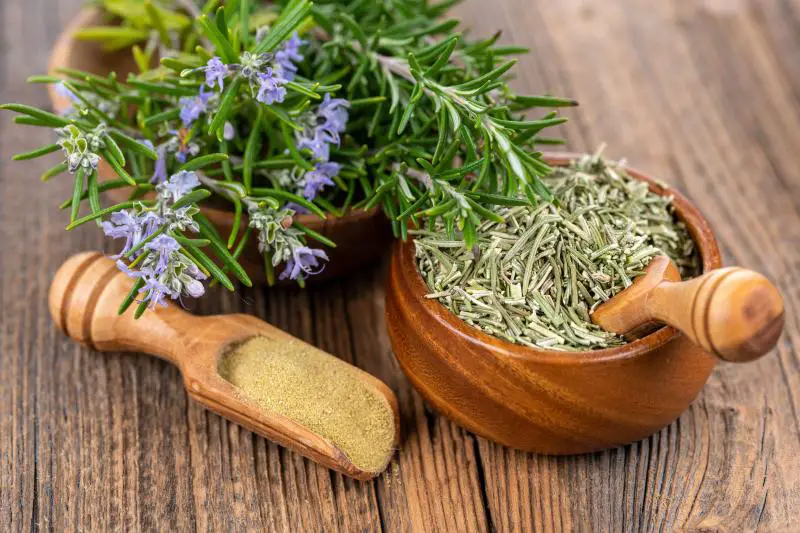Rosemary is more than just a fragrant herb found in kitchens. For thousands of years, this evergreen plant from the Mediterranean has been prized for both flavor and healing power. Ancient civilizations used rosemary in food, rituals, and medicine, believing it could sharpen memory, protect health, and bring spiritual clarity. Its distinctive aroma and refreshing taste made it a treasured ingredient in daily life.
In modern times, science has confirmed many of these traditional beliefs. Rosemary is now recognized as a source of antioxidants, essential oils, and compounds that benefit both body and mind. From enhancing meals to supporting wellness routines, its uses are broad and impactful. Asking “What is rosemary good for?” reveals a journey that blends history, culture, and proven health discoveries.
Rosemary and Its Role in Digestive Health

One of the most well-documented benefits of rosemary is its support for digestive health. Traditionally, people brewed rosemary tea to relieve bloating, cramps, and indigestion. The herb contains natural compounds such as rosmarinic acid and carnosol that can stimulate bile production. This process helps the body break down fats more efficiently and improves nutrient absorption. For individuals who often struggle with sluggish digestion, rosemary may provide a natural and gentle boost that promotes overall comfort after meals.
Modern studies confirm that rosemary has carminative properties, meaning it helps reduce gas and abdominal discomfort. Its anti-inflammatory effects can also soothe the stomach lining, reducing irritation caused by stress or poor diet. Some research suggests that rosemary extracts may help balance gut bacteria, supporting the growth of beneficial microbes while discouraging harmful strains. These scientific findings validate what traditional healers understood for centuries about the herb’s digestive power. It bridges the gap between ancient practices and contemporary wellness science.
Incorporating rosemary into daily routines does not require complicated methods. Fresh sprigs can be added to roasted vegetables, soups, or meats for both flavor and benefit. Rosemary tea offers a simple and warming remedy for unsettled stomachs, while capsules or tinctures provide concentrated doses for targeted support. Some people also use rosemary essential oil in aromatherapy to reduce nausea and motion sickness. Whether enjoyed in cooking or prepared as a tea, rosemary provides a versatile and natural option for maintaining digestive health.
Rosemary for Brain Health and Memory
Rosemary has long been linked to mental clarity and sharper memory. Ancient Greek students wore sprigs of rosemary while studying, believing its scent could improve concentration. Today, science has begun to uncover how this tradition holds truth. The essential oils in rosemary contain compounds like 1,8-cineole that appear to influence brain chemistry. These active elements may help improve focus and boost cognitive performance, making rosemary a natural ally for mental tasks.
Recent studies suggest that inhaling rosemary aroma can enhance memory retention and alertness. In one experiment, participants exposed to rosemary scent performed better on memory tests compared to those who were not. Researchers believe this effect comes from rosemary’s ability to increase acetylcholine activity, a neurotransmitter crucial for memory and learning. Such findings highlight how a simple herb can have measurable impacts on the brain.
Beyond memory, rosemary may also play a role in protecting the brain against age-related decline. Antioxidants within the herb help reduce oxidative stress, which can damage brain cells over time. Some research indicates that rosemary extract might offer protective effects against conditions like Alzheimer’s disease, although more studies are needed. Whether enjoyed in meals, brewed into tea, or diffused as essential oil, rosemary supports both short-term focus and long-term brain health. Its unique combination of tradition and scientific validation makes it one of the most remarkable herbs for cognitive support.
Rosemary and Heart Health Benefits
Rosemary is not only a culinary delight but also a supportive herb for cardiovascular health. Traditionally, it was used in herbal medicine to improve circulation and vitality. Its natural compounds, including rosmarinic acid and carnosic acid, have been shown to promote blood vessel function and reduce inflammation. These effects may support better blood flow, helping the heart work more efficiently. For people concerned about long-term wellness, rosemary can be a simple addition that aids overall cardiovascular balance.
Scientific studies highlight rosemary’s potential to influence blood pressure and cholesterol levels. Some research indicates that rosemary extracts may help reduce levels of LDL cholesterol while raising protective HDL cholesterol. By lowering harmful fats in the bloodstream, rosemary contributes to reducing the risk of arterial plaque buildup. Additionally, its antioxidant properties help protect blood vessels from oxidative stress, a factor linked to heart disease. This combination of benefits makes rosemary an herb worth considering in heart-supportive diets.
Incorporating rosemary into meals provides an easy way to promote heart health. Seasoning roasted vegetables, lean meats, or whole grains with rosemary enhances both flavor and wellness. Rosemary tea can be another gentle method for daily support, offering hydration alongside cardiovascular benefits. While rosemary is not a substitute for medical treatment, its protective properties make it a valuable partner in heart care. Regular use, paired with a healthy lifestyle, can help strengthen the body’s natural defenses against cardiovascular issues.
Anti-Inflammatory and Immune-Boosting Properties of Rosemary
Rosemary has been celebrated for centuries as a natural remedy for reducing inflammation. Its bioactive compounds, such as carnosic acid and rosmarinic acid, are powerful antioxidants that help neutralize free radicals. By reducing oxidative stress, rosemary helps protect tissues from damage and lowers the risk of chronic inflammation. This effect can be especially valuable for people struggling with conditions like joint stiffness, muscle soreness, or digestive irritation. Regular use of rosemary in diet or supplements may offer gentle, ongoing relief.
Scientific research has further confirmed rosemary’s role in supporting immune health. Studies show that its essential oils contain antimicrobial and antifungal properties. These can help the body defend itself against harmful bacteria, yeast, and even some viruses. By reducing the microbial load, rosemary strengthens the immune system’s natural defenses. Additionally, the herb’s anti-inflammatory action helps regulate immune responses, ensuring they remain effective without becoming overactive. This balanced support contributes to overall resilience and well-being.
Adding rosemary to meals or teas provides a simple way to harness these benefits. Its earthy, aromatic flavor blends easily with soups, vegetables, or herbal infusions. Rosemary essential oil can also be diffused at home, creating an environment that supports respiratory health and boosts immunity. While it should not replace medical treatments, rosemary serves as a natural companion for a stronger immune system and reduced inflammation. Through both tradition and science, it proves itself as a valuable herb for enhancing the body’s defenses.
Rosemary for Skin and Hair Health
Rosemary is widely recognized for its ability to promote radiant skin and stronger hair. Traditionally, rosemary infusions were used as rinses to refresh the scalp and add shine to hair. The herb is rich in antioxidants that protect skin cells from environmental damage caused by pollution and sunlight. These protective qualities help slow down signs of aging, keeping the skin looking firm and healthy. For many, rosemary has become a natural beauty aid passed down through generations.
Modern studies reveal that rosemary extract stimulates circulation when applied to the scalp. Improved blood flow delivers more nutrients to hair follicles, encouraging growth and reducing thinning. Its antimicrobial properties also help keep the scalp clean and free from dandruff. In skincare, rosemary oil has shown potential to reduce acne by limiting bacteria on the skin’s surface and calming inflammation. Some findings even suggest rosemary may help lighten dark spots, offering a more even complexion. These combined effects make rosemary valuable for both daily care and targeted treatments.
Practical use of rosemary for beauty is simple and versatile. Rosemary essential oil can be diluted with a carrier oil and massaged into the scalp to encourage hair vitality. Rosemary tea or cooled infusions may serve as natural toners for the skin, tightening pores and refreshing the complexion. Commercial shampoos, serums, and creams often include rosemary extract because of its proven effectiveness. Whether used in home remedies or modern cosmetics, rosemary continues to stand out as a trusted herb for maintaining healthy, glowing skin and strong, vibrant hair.
Rosemary for Stress Relief and Mental Well-Being
Rosemary has long been valued not only for physical health but also for emotional balance. Its refreshing aroma has been used in traditional practices to clear the mind and lift the spirit. The essential oils in rosemary interact with the nervous system when inhaled, creating a calming effect. This natural response helps reduce feelings of tension and restlessness, making rosemary a supportive herb for mental relaxation. Many people turn to rosemary aromatherapy to create a peaceful environment after long or stressful days.
Scientific research supports rosemary’s impact on stress reduction. Studies have found that inhaling rosemary essential oil can lower levels of cortisol, the hormone closely linked to stress. Lower cortisol levels contribute to a calmer state of mind and improved resilience during daily challenges. Rosemary’s ability to enhance blood circulation in the brain may also contribute to sharper mental clarity. Combined, these effects suggest that rosemary not only calms the body but also sharpens focus.
Practical applications of rosemary for stress relief are easy to adopt. Diffusing rosemary essential oil in a room can refresh the atmosphere and encourage relaxation. Adding a few drops to a warm bath creates a spa-like experience that soothes both body and mind. Drinking rosemary tea may also promote calmness, as the gentle warmth combines with the herb’s aromatic qualities. Whether used alone or in combination with other calming practices, rosemary provides a natural way to ease stress and support emotional well-being.
Rosemary and Respiratory Health Support
Rosemary has a long history of use in soothing the respiratory system. Traditional healers often relied on rosemary steam to ease breathing difficulties during seasonal illnesses. The herb contains natural compounds such as cineole, which has expectorant properties. These compounds help loosen mucus in the airways, making it easier to clear congestion. For people dealing with colds or mild respiratory discomfort, rosemary offers a gentle and aromatic form of relief.
Scientific research has begun to confirm these traditional practices. Studies show that rosemary essential oil can have bronchodilator effects, helping open air passages for smoother airflow. Its antimicrobial qualities also make it effective in fighting bacteria and viruses that affect the lungs and throat. Inhaling rosemary vapors may reduce inflammation in the respiratory tract, which can ease coughing and irritation. These combined actions position rosemary as a supportive herb for maintaining healthier breathing.
There are several practical ways to use rosemary for respiratory wellness. A simple method is adding fresh rosemary sprigs to hot water and inhaling the steam to relieve congestion. Essential oil diffusers can spread rosemary’s therapeutic aroma throughout a room, supporting clear airways. Drinking warm rosemary tea may also provide comfort by soothing throat irritation while delivering mild antimicrobial effects. While rosemary should not replace medical treatments for chronic respiratory conditions, it serves as a natural and accessible option to complement daily care. This makes rosemary an herb that not only flavors meals but also promotes easier, healthier breathing.
Rosemary for Weight Management and Metabolism
Rosemary has recently gained attention for its potential role in supporting weight management. Traditionally, it was used as a digestive aid, but modern research suggests it may also influence how the body processes fats. Compounds like carnosic acid appear to help regulate lipid metabolism, which can reduce fat accumulation. By improving the way the body handles dietary fats, rosemary may indirectly support healthy weight goals. Its natural properties make it a gentle companion for those seeking balance rather than quick fixes.
Studies have highlighted rosemary’s ability to influence enzymes related to fat storage. Some findings suggest that rosemary extract can reduce the activity of enzymes that promote fat accumulation in the body. At the same time, its antioxidant action helps lower inflammation, which is often linked to obesity and metabolic disorders. This dual effect—improving fat metabolism and reducing inflammation—shows promise for rosemary as a supportive tool in metabolic health. However, it should be seen as a complement to diet and lifestyle rather than a substitute.
In daily practice, rosemary can be incorporated into meals to provide both flavor and subtle metabolic support. Adding fresh rosemary to lean proteins, roasted vegetables, or soups creates dishes that are both satisfying and health-conscious. Rosemary tea can also serve as a low-calorie beverage that aids digestion and curbs cravings. Some people use rosemary supplements for more concentrated benefits, but simple culinary use is often sufficient. With regular inclusion, rosemary supports not only weight balance but also overall metabolic efficiency, aligning with broader wellness goals.
Rosemary for Oral Health and Fresh Breath
Rosemary has been used for centuries as a natural remedy to maintain oral cleanliness and fresh breath. Its aromatic oils provide a refreshing taste that makes it a valuable addition to traditional mouth rinses. Beyond flavor, rosemary contains antimicrobial compounds that target bacteria responsible for bad breath. This dual benefit—aroma and antibacterial action—explains why rosemary has remained a trusted herb in oral care traditions across cultures. For people seeking natural solutions, rosemary offers a safe and effective alternative to chemical-based products.
Modern studies show that rosemary extracts can help reduce harmful microbes in the mouth. Bacteria linked to gum disease and tooth decay are sensitive to the herb’s natural oils. By lowering bacterial growth, rosemary helps protect gum tissue and maintain healthier teeth. Its anti-inflammatory properties may also ease mild gum irritation, creating a more comfortable oral environment. Some evidence even suggests that rosemary’s antioxidant effects could help slow plaque formation, further protecting oral health. When combined with daily brushing and flossing, rosemary offers an additional layer of protection that is both gentle and effective.
There are several easy ways to use rosemary for oral health. A homemade mouth rinse can be made by steeping rosemary sprigs in hot water and allowing the infusion to cool. This rinse helps freshen breath while delivering gentle antibacterial effects. Chewing on fresh rosemary leaves provides a quick natural breath freshener in moments of need. Some natural toothpaste and mouthwash brands also include rosemary extract for its proven effectiveness. Whether used in simple home remedies or modern oral care products, rosemary continues to shine as a supportive herb for a healthy mouth and lasting freshness.
Rosemary for Liver Health and Detoxification
Rosemary has been traditionally valued for its ability to support liver health and detoxification. The liver is the body’s main detox organ, responsible for filtering toxins and breaking down waste. Compounds in rosemary, such as carnosic acid and rosmarinic acid, provide antioxidant protection that helps reduce oxidative stress on liver cells. This protective action supports the liver’s natural functions, ensuring it can process harmful substances more effectively.
Modern research has begun to explore rosemary’s role in enhancing liver function. Some studies suggest that rosemary extract may stimulate the production of detoxifying enzymes in the liver. These enzymes play a key role in neutralizing toxins and promoting their safe removal from the body. In addition, rosemary’s anti-inflammatory properties can help reduce liver inflammation, which is often linked to poor diet, stress, or environmental pollutants. By supporting liver resilience, rosemary contributes to overall metabolic health and energy balance.
Incorporating rosemary into daily life can be both practical and enjoyable. Drinking rosemary tea provides gentle support for liver function while also aiding digestion. Fresh rosemary added to meals delivers not only flavor but also a steady supply of beneficial compounds. Some people also take standardized rosemary supplements for more concentrated effects, though culinary use often provides ample support. While rosemary should not replace medical treatment for liver conditions, its natural properties make it an excellent companion for a healthier detox system. By combining tradition and science, rosemary shows promise as a herb that promotes a cleaner, stronger, and more efficient liver.
Culinary Uses and Flavorful Benefits of Rosemary
Rosemary is one of the most versatile herbs in the culinary world. Its strong aroma and slightly pine-like flavor enhance a wide variety of dishes, from roasted meats to vegetables and breads. In Mediterranean cuisine, rosemary has been a staple ingredient for centuries, adding depth to recipes while also offering health benefits. Beyond its taste, rosemary contains essential oils and antioxidants that remain stable even when heated, making it ideal for cooking. This unique property sets rosemary apart from many delicate herbs that lose their potency when cooked.
The culinary value of rosemary extends far beyond flavor. Research suggests that using rosemary in cooking may help preserve food due to its natural antimicrobial properties. It can slow the growth of bacteria in prepared dishes, adding both safety and freshness. Rosemary also enhances digestion when paired with heavy meals, as it stimulates bile flow and aids in breaking down fats. These qualities make rosemary an excellent herb for balancing rich flavors with digestive support. By combining taste with function, rosemary elevates both the sensory and health aspects of food.
In practice, rosemary is easy to incorporate into everyday meals. Fresh sprigs can be tucked into roasts, stews, or grilled vegetables, while dried rosemary offers convenience for quick seasoning. Infusing olive oil with rosemary creates a flavorful base for salad dressings or marinades. Even baked goods such as bread or crackers gain a fragrant twist with the herb. Whether used fresh, dried, or infused, rosemary adds more than just seasoning—it enriches meals with layers of flavor and wellness. Its culinary role highlights how food and health can come together in simple, delicious ways.
Rosemary Benefits in Beauty and Personal Care
Rosemary has long been prized not only as a culinary herb but also as a powerful ingredient in beauty and personal care. Its natural antioxidant and anti-inflammatory compounds make it highly effective in promoting healthy skin and hair. In skincare, rosemary extract is frequently included in creams, lotions, and toners because it helps improve circulation, which supports a radiant complexion. Its antibacterial qualities also aid in reducing breakouts and calming irritation, making it a gentle yet effective option for individuals with sensitive or acne-prone skin. Over time, regular use of rosemary-infused products can enhance skin elasticity and slow down the visible signs of aging.
In hair care, rosemary oil has gained attention as a natural remedy for stimulating growth and preventing thinning. Massaging diluted rosemary oil into the scalp increases blood flow to hair follicles, strengthening roots and promoting thicker, shinier hair. Many shampoos and conditioners now include rosemary as a key ingredient to combat dandruff, soothe dryness, and add natural luster. Because it is plant-based and free from harsh chemicals, rosemary appeals to consumers seeking eco-friendly and sustainable personal care solutions.
Beyond direct applications, rosemary’s refreshing aroma contributes to aromatherapy benefits in beauty routines. Its invigorating scent enhances relaxation while reducing stress, which indirectly supports overall skin and hair health. From facial serums to bath salts, rosemary is incorporated into an array of wellness products that blend beauty with holistic care. As interest in natural and organic cosmetics continues to rise, rosemary stands out as a versatile ingredient that bridges tradition and modern innovation, offering both therapeutic and aesthetic benefits in everyday self-care practices.
Rosemary in Traditional Medicine
In traditional medicine, rosemary has been celebrated as a versatile healing herb with a wide range of applications. Historical records from ancient Greece and Rome describe its use in rituals to enhance memory, sharpen focus, and ward off negative energy. In medieval Europe, rosemary was valued as a natural protector against infections and was often burned in homes or carried as an herbal charm. Traditional healers also prescribed rosemary tea as a remedy for indigestion, poor circulation, and headaches, highlighting its ability to balance the body’s internal systems naturally.
Beyond Europe, rosemary found its place in many folk traditions across Asia and the Middle East. It was frequently used to relieve respiratory conditions, where inhaling steam infused with rosemary leaves helped ease coughs and congestion. In addition, poultices made from crushed leaves were applied to sore muscles and joints, providing warmth and comfort. Some traditional practices also relied on rosemary to improve mood, reduce melancholy, and encourage restful sleep, underscoring its role in both physical and emotional healing.
The enduring use of rosemary in traditional medicine illustrates how deeply it was trusted for promoting overall well-being. Healers valued its warming, stimulating qualities, seeing it as a way to restore energy, support circulation, and strengthen the body’s natural defenses. Even today, many of these time-tested uses continue to inspire natural health remedies and holistic treatments. By connecting with the wisdom of past generations, rosemary serves not only as a culinary herb but also as a powerful symbol of healing traditions that continue to influence modern approaches to wellness.
Rosemary for Natural Deodorizing and Preservation
Rosemary’s strong, refreshing aroma makes it an excellent natural deodorizer, long valued for keeping spaces fresh and pleasant. Dried rosemary sprigs or sachets are often placed in closets, drawers, or shoes to neutralize unwanted odors without relying on chemical fragrances. In traditional households, rosemary was burned as incense to purify the air and repel insects, a practice that continues today in eco-conscious lifestyles. Its essential oil, when diffused, provides both a clean scent and antibacterial benefits, reducing stale air and contributing to a healthier indoor environment.
Beyond its deodorizing qualities, rosemary is also recognized for its natural preservative powers. Rich in antioxidants such as rosmarinic acid and carnosic acid, rosemary extract has been used to extend the shelf life of oils, meats, and baked goods. Food industries increasingly rely on rosemary as a natural alternative to synthetic preservatives, aligning with consumer demand for clean-label products. Even in home kitchens, adding a sprig of rosemary to olive oil or vinegar not only enhances flavor but also slows oxidation, keeping ingredients fresher for longer periods.
In everyday natural care, rosemary’s dual ability to deodorize and preserve offers practical, sustainable solutions. Homemade cleaning sprays often include rosemary oil for its antibacterial action and fresh scent, making them effective for kitchens and bathrooms. Similarly, infusions of rosemary can be used as natural rinses for cutting boards or food containers, combining hygiene with eco-friendly practices. By replacing artificial chemicals with this versatile herb, rosemary empowers households to maintain freshness and cleanliness while staying connected to traditional wisdom and sustainable living.
Rosemary in Landscaping and Environmental Benefits
Rosemary is not only valued for its culinary and medicinal qualities but also for its role as a versatile landscaping plant. Its evergreen foliage, aromatic leaves, and delicate blue to purple flowers make it an attractive addition to gardens year-round. Because rosemary thrives in poor, rocky soils and tolerates drought, it is frequently used in xeriscaping, a sustainable landscaping approach that conserves water. Homeowners and landscape designers appreciate its ability to form low hedges, ground covers, or container plants, bringing both beauty and functionality to outdoor spaces.
From an ecological perspective, rosemary plays a valuable role in supporting biodiversity. Its nectar-rich flowers attract pollinators such as bees, butterflies, and beneficial insects, helping to sustain populations that are vital for food production and garden health. Planting rosemary in mixed borders or near vegetable gardens encourages natural pollination and can even deter certain pests with its strong scent. In regions with fragile ecosystems or limited rainfall, rosemary serves as a hardy plant that supports the local environment without demanding heavy resources, making it a sustainable choice for eco-friendly gardening.
Beyond aesthetics and ecology, rosemary contributes positively to the microclimate of its surroundings. Dense plantings help reduce soil erosion, stabilize slopes, and protect the ground from excessive heat. Its evergreen nature also provides year-round greenery, improving air quality while adding structure to gardens during the winter months when many other plants fade. By incorporating rosemary into landscaping projects, gardeners not only enhance the visual appeal of their spaces but also create resilient, sustainable environments that benefit both people and nature.
FAQ About Benefits of Rosemary
What is rosemary good for in everyday health?
Rosemary is good for supporting digestion, improving circulation, and boosting memory. Drinking rosemary tea or using essential oil in aromatherapy may reduce stress and headaches. Thanks to its antioxidants, rosemary also strengthens the immune system and protects the body against free radicals that contribute to aging and disease.
Can rosemary improve skin and hair health?
Yes, rosemary offers many benefits for beauty. Rosemary extract helps calm skin irritation, reduce acne, and improve elasticity. Rosemary oil stimulates scalp circulation, encouraging hair growth and reducing dandruff. With regular use, it adds shine and thickness to hair, making it a natural alternative to harsh chemical treatments for skin and hair care.
Is rosemary effective for stress relief?
Rosemary is widely used in aromatherapy for its calming yet energizing scent. Inhaling rosemary essential oil can lower stress levels, reduce mental fatigue, and improve focus. It has also been shown to ease mild headaches and promote relaxation, making it an excellent addition to wellness routines for both body and mind.
How is rosemary used in cooking and food preservation?
Rosemary enhances flavor in meats, vegetables, and soups while also extending shelf life thanks to its antioxidant compounds. Rosemary extract is often added to oils or baked goods to delay spoilage. At home, a sprig of rosemary infused in olive oil boosts both taste and freshness, making it a dual-purpose culinary herb.
What are traditional medicinal uses of rosemary?
In traditional medicine, rosemary was used to aid digestion, improve memory, and ease muscle pain. It was also applied in poultices for joint stiffness and inhaled to relieve respiratory discomfort. These time-tested uses highlight rosemary’s role as a trusted natural remedy, bridging ancient wisdom with modern herbal health practices worldwide.
Conclusion
Rosemary is a remarkably versatile herb whose benefits extend far beyond the kitchen. From traditional medicine to modern beauty care, from mental relaxation to natural preservation, it continues to prove its healing power and practical value. Additionally, its role in landscaping and environmental sustainability enhances living spaces while supporting biodiversity. By incorporating rosemary into daily routines—whether in health, beauty, household care, or gardening—people can enjoy both its wellness properties and its ability to harmonize human life with nature. Rosemary truly stands as a timeless bridge between tradition and modern living.






